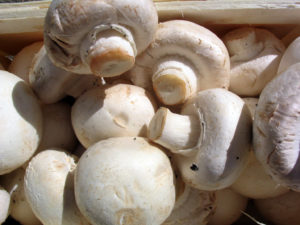
Mushrooms – Raw or Cooked?
Dr. Joel Fuhrman MD has been a strong advocate of a whole food plant based (WFPB) diet for many years. Foods that he has labeled as particularly nutritious and health-promoting include greens, beans, onions, mushrooms, berries and seeds. When it comes to mushrooms, he strongly recommends that they should only be eaten cooked. He writes: “Several raw culinary mushrooms contain a potentially carcinogenic substance called agaritine, and cooking mushrooms significantly reduces their agaritine content.”
Upon being informed of Dr. Fuhrman’s recommendation, Dr. Michael Greger of Nutritonfacts.org came to the same conclusion after perusing the scientific research.
A Dissenting Opinion
In this article, Monica Reinagel MS. LDN. CNS, makes a strong case that the concern about agaritine in raw mushrooms is overblown. She reminds us that taking an overly reductionist view of nutrition is not a good idea. After all, nutrition is a wholistic phenomenon. Reinagel writes:
“While drugs are generally single agents, foods contain multiple bioactive compounds. Mushrooms, in particular, contain many compounds that may boost immune function and lower cancer risk. One study found that a substance in white button mushrooms may reduce the risk of breast cancer by reducing estrogen levels in breast tissue and another found that an extract of white button mushrooms reduced the growth of tumors in mice with breast cancer.”
She also points out that although agaritine has the potential to cause DNA damage, mushrooms seem to contain more cancer preventive chemicals than cancer-causing ones.
Reinagel informs us that in addition to being broken down by heat, agaritine also breaks down when mushrooms are refrigerated, dried, or even just stored. She contends that the raw mushrooms that you purchase at your local supermarket or salad bar contain a fraction of the agaritine found in a freshly picked mushroom.
Swedish Researchers
The authors of this Swedish study calculated that the amount of agaritine the typical mushroom eater is exposed to over the course of their lifetime could potentially lead to 1 extra case of cancer per 50,000 lifetimes. As carcinogens go, it is a pretty weak one. And Reinagel reiterates that when agaritine is consumed in raw mushrooms, it’s delivered with an array of cancer preventive compounds.
Reinagel has concluded that she doesn’t believe that eating raw mushrooms is as risky as the current research implies. She admits that some may interpret the research differently than she does, but she feels completely comfortable continuing to eat both raw and cooked mushrooms.
Other Problem with Raw Mushrooms Besides Agaritine
World renowned mycologist Paul Stamets unambiguously recommends that mushrooms should never be eaten raw. In addition to the problem of agaritine, he cites another problem. He writes:
“Raw mushrooms are largely indigestible because of their tough cell walls, mainly composed of chitin. Dr. Andrew Weil advises, in agreement with other experts, that mushrooms must be cooked! “Mushrooms have very tough cell walls and are essentially indigestible if you don’t cook them. Thoroughly heating them releases the nutrients they contain, including protein, B vitamins, and minerals, as well as a wide range of novel compounds not found in other foods,” (Prevention, Feb 1, 2013).”
Cathy Scott, Chief Science Officer at Everything Mushrooms, adds the following on the indigestibility of raw mushrooms:
“The cell walls of mushrooms can be difficult to digest; they might even give you a tummy ache, or more severe intestinal distress if eaten raw. Mushroom cell walls contain chitin, the same polysaccharide that makes the hard outer shells of insects and crabs. Chitin and other components of the cell wall can be made more digestible by cooking. A little heat not only can avert a potential tummy ache but also helps release the many beneficial nutrients locked inside the cells.”
My Thoughts
If you follow a whole food plant-based (WFPB) diet and eat the occasional raw mushroom (non-poisonous of course!), you will probably be fine. However, if you notice some gastrointestinal distress after eating raw mushrooms, you may want to avoid them.
Both Dr. Fuhrman and Dr. Greger strongly promote the consumption of cooked mushrooms as part of a WFPB diet. So if you like cooked mushrooms, eat them. If you don’t like mushrooms, cooked or raw, you can still reap the benefits of following a WFPB diet.
Mushrooms and Cancer
If you are a cancer patient or survivor, you may want to investigate mushrooms further, in particular these three:
- Maitake
- Reishi and
- Turkey Tail
Research is showing that these mushrooms or their extracts may be useful as adjuncts to conventional cancer therapies. This particular study on Turkey Tail mushrooms is especially intriguing as is Paul Stomets personal story about his mother’s amazing breast cancer recovery. It seems that Turkey Tail mushrooms help to strengthen a patient’s immune system as he/she undergoes conventional treatment.
Many more studies need to be conducted on mushrooms and because mushrooms can’t be patented, don’t hold your breath waiting for pharmaceutical companies to fund such studies. So we can only hope that the National Institutes of Health/National Center for Complimentary and Alternative Medicine will continue to fund mushroom research.
Stay Healthy and Strong!






 E Excerpt from Laurie Endicott Thomas’s amazing book Thin Diabetes – Fat Diabetes by clicking here!
E Excerpt from Laurie Endicott Thomas’s amazing book Thin Diabetes – Fat Diabetes by clicking here!
Very interesting and informative post — thanks, Dom.